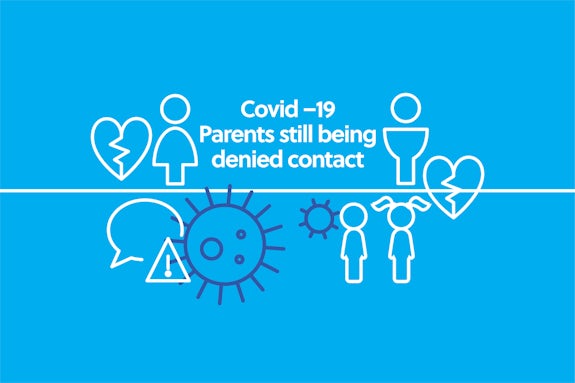
October 8, 2024

My colleague, Sarah Feeney, in her blog of 27 March, reported on the clarification given that morning by Michael Gove in relation to children of separated parents being allowed to move from one household to another during the current lock down.
Yet despite that Shared Parenting Scotland has today issued a statement that a significant number of parents are not letting this happen. National manager Ian Maxwell has said “Results so far show that 61 per cent of separated parents have experienced reduced time or no contact at all with their children since the start of the lockdown… The proportion who are completely blocked from seeing their children has risen from 13 per cent to 29 per cent.”
This is a startling figure. Many of the parents who are being denied contact will probably have already had to endure months of solicitor involvement in order to obtain contact, some will have had to raise a court action to do so and will have rightly assumed that once the court had made its order the other parent would have to comply with it.
There is no doubt from the enquires I have received since lockdown started that there are some parents who are taking advantage of the current unprecedented times to refuse contact without justification. There will be some parents where, in all the circumstances, a refusal is reasonable and there will also be parents who are genuinely concerned about the increased risk to their children and to other family members if their child is allowed to move between two homes.
What if one parent is working from home or doesn’t work and the other is a key worker? What if one parent has another family member in the household who is classed as vulnerable? Should the Government have provided clearer guidelines rather than leave it parents to argue over their children?
On 27 March the Lord President , Lord Carloway issued ‘Coronavirus Crisis: Guidance on Compliance with Court Orders Relating to Parental Responsibilities and Rights’ A copy can be found at https://www.scotcourts.gov.uk/docs/default-source/default-document-library/guidance-on-compliance-with-family-court-orders-27-03-20.docx?sfvrsn=0
What this makes clear at the outset is that parental responsibility rests with the child’s parents, not with the Government and not with a court. It recognises that parents may feel particularly concerned about contact during the coronavirus outbreak. It encourages parents to communicate to come up with reasonable and practical solutions. Where that results in a change to the pre-existing arrangement or court order then it suggests that this is recorded in a ‘note, email or text message to each other’.
Where one parent unilaterally makes the decision not to comply with a court order for contact the guidance makes it clear that a court will look at whether that parent acted reasonably and sensibly in the light of the Government guidance in place at that time, together with any specific evidence relating to the child or family. This is a reference to a court being asked to make a finding of ‘failure to obtemper a court order’ commonly referred to as being found in contempt.
It’s all well and good being told as a parent that you can ask the court to consider the other parent’s actions and decide if they were reasonable but that it likely to be several weeks if not months down the line, involve expense and achieve little more than a stern warning to the defaulting parent. It will be interesting to see how many parents are actually brought before a court for this reason once the lockdown is removed and the courts are operating at full capacity again. For most parents, however, this is a remedy but not the solution, what they want is to be able to see their children.
Can anything else be done?
What I have found is that if parents can communicate with one another they can often address the other parent’s concerns. Can you agree to adopt the same practical measures within both households? It could be something as simple as agreeing where the allowed daily exercise is to take place or whether essential food shopping is being done online rather than a trip to the shops. Is food being ‘wiped down’ before being placed in the fridge or cupboards? Is the packaging being immediately placed into bins outside the home? It may seem to one parent that the other is being overly anxious and the measures being taken by them are extreme, but if all it takes is to agree to adopt them then is this a better solution than being denied contact?
Sadly there will be some parents who are unable to communicate directly, this will generally lead to frustration and accusations of unreasonableness. I would encourage those parents to enlist the help of an online mediator. Experienced mediators can very effectively defuse such situations and help parents come to a sensible solution.
Finally there will be some parents who abuse the current situation and deny contact without good reason perhaps in the belief that nothing can be done. A list of civil court priorities was recently published by the Scottish Courts and Tribunals Service which sets out the ‘urgent and necessary’ civil business that will continue to be dealt with during the coronavirus lockdown, Included in that list is ‘urgent applications in relation to parental responsibilities and rights, for example in relation to contact and residence’.
What hasn’t been made clear is what qualifies as ‘urgent’. What we do know is that Shared Parenting Scotland has now written to the Lord President and the Justice Secretary to urge that decisions on whether children should see one of their parents should have high priority. Holyrood’s Justice Committee said it will write today to the Justice Secretary on the issue.
With the current lock down restrictions likely to be extended for a further three weeks at least we may therefore find that the courts will be prepared to accept as ‘urgent’ any application where a parent has refused all contact. Parents who do so without good reason be warned!
Our specialist family Law team are fully up to date with the situation and aware of guidance from the Scottish Courts Service and the measures being put in place to deal with such issues as and when they arise. We have put in place measures to ensure there is no disruption to our service during this difficult time. Whilst working remotely, all members of our team are fully operational, working as normal and contactable by all the usual methods.
We have a team of experienced mediators who are all CALM accredited who can help you through these unprecedented times no matter where you live in Scotland
If you like to discuss this with Denise please give her a call on 0141 370 8130 or dlaverty@gilsongray.co.uk.
The information and opinions contained in this blog are for information only. They are not intended to constitute advice and should not be relied upon or considered as a replacement for advice. Before acting on any of the information contained in this blog, please seek specific advice from Gilson Gray.

Sarah is an Associate with Gilson Gray. She is accredited by the Law Society of Scotland as a mediator and is also a trained collaborative practitioner and is a member of Consensus. Sarah is a dedicated family lawyer and has specialised in family law since 2009.